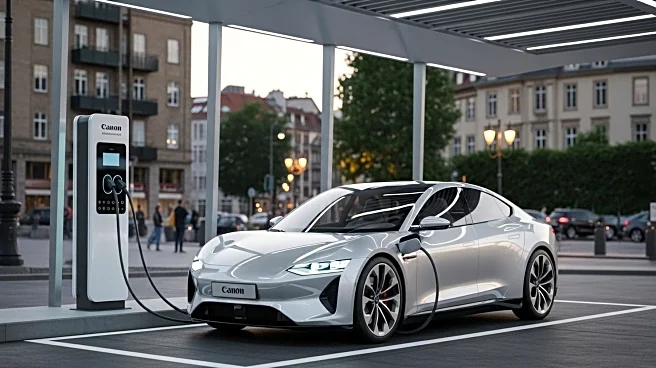What is the story about?
What's Happening?
Chinese electric vehicle (EV) manufacturers are increasingly making their presence felt in the European market, as evidenced by their strong showing at the IAA auto fair in Munich. Companies like BYD have seen significant sales growth, with a 250 percent increase in Europe during the first half of the year. These manufacturers are leveraging lower labor costs, government support, and advanced technology to compete with established European brands. Despite the European Union imposing tariffs on Chinese-made EVs due to alleged unfair state subsidies, Chinese companies continue to gain traction. BYD plans to circumvent these tariffs by opening a factory in Hungary later this year. However, skepticism remains among European consumers regarding the reliability and service networks of Chinese vehicles.
Why It's Important?
The growing presence of Chinese EV manufacturers in Europe represents a significant shift in the automotive industry, challenging long-established European brands like Volkswagen, BMW, and Mercedes-Benz. This competition is forcing European automakers to innovate and adapt, potentially leading to mass layoffs and strategic changes. The influx of Chinese vehicles could alter market dynamics, affecting pricing, consumer choices, and the overall landscape of the European automotive sector. As Chinese companies continue to expand, they may influence global automotive standards and practices, impacting industry stakeholders and consumers alike.
What's Next?
Chinese manufacturers are expected to continue expanding their operations in Europe, with plans to establish local production facilities to bypass tariffs. European automakers are likely to respond by enhancing their EV offerings and adopting new technologies to maintain competitiveness. The ongoing competition may lead to further regulatory actions by the EU to protect domestic industries. Additionally, Chinese companies will need to build trust with European consumers and develop robust service networks to sustain their growth.
Beyond the Headlines
The expansion of Chinese EVs in Europe could have broader implications for international trade relations and economic policies. It may prompt discussions on the balance between free trade and protectionism, as well as the role of government subsidies in global markets. The situation also highlights the importance of technological innovation and adaptation in maintaining industry leadership, potentially influencing future automotive trends and consumer preferences.















